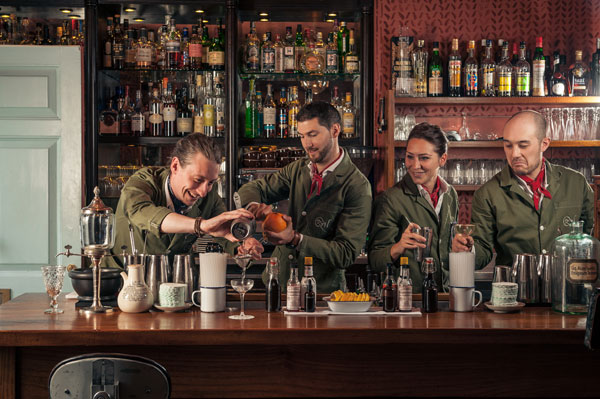Costume drama: keep up to date on dress code legislation
Whether you want your staff to dress up or down, there's a right way to ask them to do it. Rosalind Mullen looks at the latest legislation when it comes to dressing for success
Some might argue that having rules for hospitality staff that ban glitter, tattoos or dirty fingernails at work is fair enough, but recent furores over high heels, manicures and make-up show that staff grooming and dress guidelines have become a potential minefield for employers.
Indeed, a new Parliamentary report has called for the laws banning sexist dress codes at work to be enforced more readily, which means if you don't smarten up your approach you could face litigation.
In January, the House of Commons Petitions Committee and the Women and Equalities Committee called for a review and strengthening of the Equalities Act 2010 after deciding that women who are asked, for instance, to wear high heels or make-up to work are being discriminated against.
What triggered the report was a petition with more than 152,000 signatures collected by Nicola Thorp, a temp at receptionist provider Portico, who was sent home without pay from a City firm in December 2015 for refusing to wear shoes with "at least a two-inch heel". Her widely reported argument was that men don't have to wear such crippling footwear. Responding to the recent report, Portico's managing director Simon Pratt says: "We fully support the recommendations and welcome the debate in Parliament in March. Portico has always been committed to being an inclusive and equal opportunities employer, so when this issue was raised last year, we immediately updated our uniform guidance."
In another incident before Christmas, female employees at the Dorchester hit out at what one called an "offensive" list of grooming demands, including not turning up for work with oily skin, bad breath, body odour or garish make-up and ensuring they shave their legs and that their nails are manicured. Critics said the five-star hotel's codes encouraged objectification and sexualisation of staff and warned it could face lawsuits.
A spokesperson at the Dorchester says: "Our presentation policy promotes cleanliness and hygiene as a priority and meets the luxury hospitality industry's high standards. We regularly review our guidelines and policies, and our policies remain compliant with UK employment law. All new male and female applicants are provided with a copy of our presentation standards in advance of the interview process and we liaise with individual employees when flexibility is required."
No lawsuits have been issued against the Dorchester, so are companies that have such rules really vulnerable? Justin Govier, partner at IBB Solicitors, says: "In short, yes, they could be open to lawsuits for sex discrimination. Any procedures should apply to male and female members of staff equally. Of course, there are differences between men and women, and policies will vary as a result
Clearly you risk a backlash if you expect staff to pay for manicures or appear to penalise them for having hormonal skin issues, but surely an employer can expect hospitality staff to have clean fingernails, hair and clothes, no body odour and fresh breath?
Govier explains: "An employer is entitled to impose policies on staff members (such as clean fingernails, clean hair and so on) when they relate directly to the requirements of the job or the work environment. Moreover, any policy needs to be reasonable and proportionate to the needs of the job. Cleanliness and a smart appearance is a reasonable requirement for a hotel worker, in my opinion."
But he adds: "An employer runs a risk (both legally and in terms of reputation) when it imposes policies on appearance that are more burdensome for women to comply with than men, and those which do not, on the face it, appear to have anything to do with an ability to perform one's job. An employer is also entitled to impose dress codes if they affect workplace health and safety." As well as sexism, employers also need to guard against dress codes infringing on religious or LGBT sensitivities, or being racist or ageist. Donald Trump has recently fallen foul of expecting his staff to dress a certain way, just days after becoming US president.
News website Axios has reported that women working for the Trump campaign "felt pressured to wear dresses" and that male employees "need to have a certain look". News of the report prompted widespread derision on social media, with women surgeons, soldiers and vicars posting photos in uniform with the hashtag #DressLikeAWoman.
Height of style
Many companies ensure their grooming guidelines are carefully worded. A list found by The Caterer online from Fairmont Scottsdale Princess, in Arizona in the US, for instance, reads: "The height of the hair above one's head should not exceed two inches, unless an employee's hair naturally does so." Then there is the amusing: "Employees must wear colour-co-ordinated socks", and it also allows for a relaxation of rules, such as length of beard, where there are "sincerely held religious beliefs".
But many employers don't realise that directions for female staff to shave their legs are not only sexist, but could also upset some whose religious beliefs don't permit hair removal.
Govier explains: "If a dress code infringes on religious, racist, ageist or sexist sensitivities, it could be known in law as 'indirect discrimination'. This is when a policy is put in place, applied to everyone (or a group of people) which disproportionately affects those people with a protected characteristic.
"At this point, the employer would only be able to defend themselves from an indirect discrimination claim if they can show that the policy is a 'proportionate means of achieving a legitimate aim'. Once more, it comes down to justification," says Govier.
"Is 'trendy' synonymous with 'young'? asks Govier. "An employer needs to be careful that it doesn't fall foul of the age discrimination laws. In practice, it usually self-filters anyway - trendy people want to work at trendy bars and, equally, untrendy people probably don't. That said, I don't see why a dress code for a trendy bar would be a problem, as long as it was appropriate and did not discriminate."
Robin Hutson, chairman and chief executive of the Lime Wood Group and Home Grown Hotels, has a foot in two style camps, so how does he handle this?
"The Pig brand is more relaxed on these issues than Lime Wood," he explains. "We certainly have a few 'interesting' looks. Appearance needs to be appropriate for the role and clearly some positions are more sensitive than others. In years gone by it was a bigger deal. For instance, facial hair for men used to be considered not correct for front of house staff, but it is acceptable these days."

son says there are written standards of appropriateness for each brand, but adds: "We like our team members to retain their individual persona; we are not looking for robots."
So, while some employers would struggle if staff arrived at work with a tattoo or colourful hair, Hutson doesn't take a blanket approach.
"It depends on the department and the extremes of the look. We would look at each case individually," he says. "In the majority of areas the uniform is the same for male and female staff. We would be tolerant of any specific religious dress requirement if it arose."
Nevertheless, "the hygiene rules apply to all," says Hutson. And he suggests that at the end of the day, employers can avoid a lot of angst by being clear at recruitment stage.
"The standards of dress and appearance in the staff handbook are part of the contract that they sign up to. We would never want to be offensive to any staff member, but it is clearly stated what we expect of them," says Hutson.
A uniform approach
Andrew Boer, principal of the Edge Hotel School in Colchester, Essex, concurs: "What staff are required to wear should be made explicit when they apply to join a company. It is the responsibility of the individual to work at an organisation where they feel comfortable as there is an expectation that they will reflect the brand standards."
His students gain experience at the commercially operated Wivenhoe House hotel, located alongside the school, and are expected to conform to the grooming standards of the four-AA-star operation to work there. "That can be a shock to undergraduates," says Boer. "We discuss it - the fact that guests need to know who the staff are and that they are an extension of the brand.

o, that there will be baseline criteria - you don't want staff to have body odour if they are delivering food. But it is a difficult and personal thing to say."
At the moment, companies are entitled to demand that employees follow grooming guidelines, but the recent Parliamentary report suggests the law will be toughened up.
Jane Sunley, chief executive at people engagement specialist PurpleCubed, has the last word: "For team members to be engaged they need to feel comfortable and confident and therefore allowed to be individuals. When it comes to dress codes - where the key word is 'reasonable' - it's understandable to have high standards. However, there should always be options and examples so that everyone is clear. There should be guidelines for both sexes, with equivalent examples as appropriate and practical."
And she is pragmatic about 'heelgate': "Companies sometimes confuse 'high heels' with'smart'. Of course, a flat shoe can be smart, though not if it's a slipper-like ballet pump."
Wear it well
Justin Govier, partner at IBB Solicitors, gives top tips on how to stay on the right side of the law.
•Put in place a clear written dress code and workplace appearance policy.
•Explain why this policy is in place and how it relates to the job roles or working environment that it applies to.
•Ensure that each aspect of the dress and workplace appearance policy serves a purpose, is justifiable and goes no further than necessary.
•Consider whether anyone with a protected characteristic is likely to be unequally affected by the policy.
•Be flexible if necessary - make it clear that anyone who feels they have
been unfairly discriminated against or affected by the policy should approach
the employer to discuss.
•Ensure that any rules are applied consistently.
•Ensure that any breaches of the code are dealt with fairly and that any disciplinary action you take is proportionate and fair.
A fresh approach at Principal
Hotel company Principal's nascent city centre hotels will each have a different identity. So, to convey the dress code to staff, director of people development Sean Wheeler is devising a creative approach.
"We are planning to show the teams a sweep of images instead of using words so it is not too prescriptive. But there are caveats, so we will have fun images of what we don't want to see, too," he says.
Hotels in Edinburgh, Manchester and York are up and running and another five are opening this year, including the transformation of the former Russell hotel to the Principal London, and three more are to open next year.
The hotel restaurants are run by local partners. At Principal Manchester, for instance, the Refuge by Volta uniform is "come as you are", although staff are supplied with an apron.
"It can be challenging," says Wheeler. "We say things like 'You look great, the hemline is a bit short, but love the shoes'. It's corrective rather than fixed."
Unlike many luxury brands, tattoos are acceptable, but there are standards: "We say that you are representing us and yourself so you need to look smart, tidy and clean."
While Wheeler underlines that hygiene is important in hospitality, he says the company would not tell its employees to, for instance, shave their legs. Instead, it generates open discussions, encouraging new staff to share their experiences of being a customer and what they felt didn't look right.
"It is a subtle approach," says Wheeler. "At induction we talk about the importance of being proud of yourself. It is difficult to talk about personal hygiene, but it is important where food is being served."
Save
Save
Save











